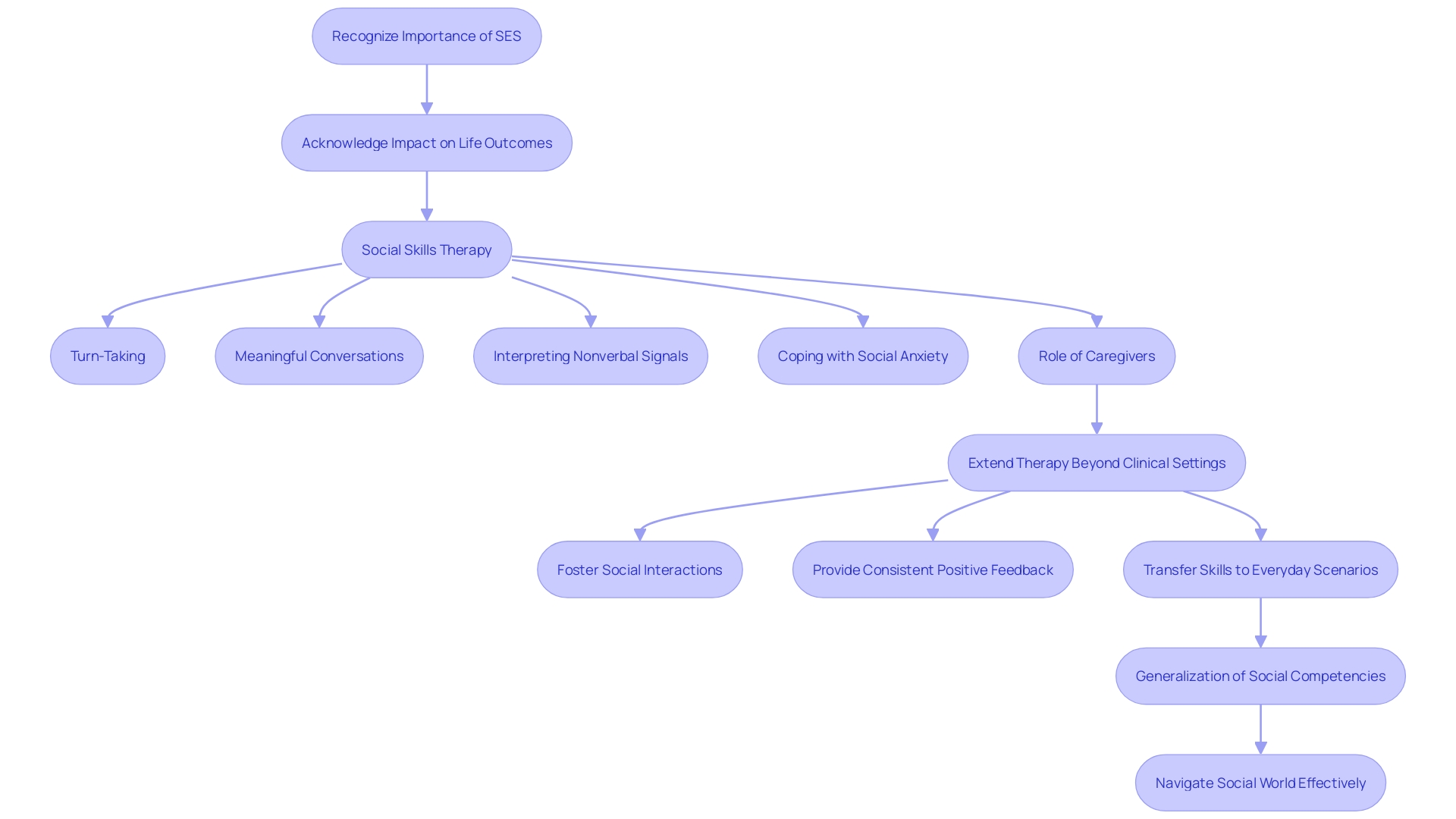Introduction
Autism Spectrum Disorder (ASD) affects millions of individuals worldwide, presenting unique challenges in communication, social interaction, and behavior. As a Parent Advocate, understanding and navigating these challenges is crucial to ensuring the well-being and success of your child with autism.
In this article, we will explore various strategies and resources that empower you as a caregiver, from effective communication techniques to facilitating emotional expression through writing. We will also delve into the importance of social skills therapy, coping mechanisms for individuals with autism, and the transformative power of creative outlets. By equipping yourself with knowledge and support, you can play a vital role in supporting and empowering your child on the autism spectrum.
Understanding Autism: Definition and Prevalence
Autism Spectrum Disorder (ASD) encompasses a variety of challenges in communication, social interaction, and behavior. Individuals on the spectrum may exhibit a diverse array of symptoms, from engaging in repetitive actions to having difficulty navigating social nuances.
The spectrum nature of autism means that it manifests differently in each person, with some requiring significant support throughout their lives. A pertinent statistic reveals that autism affects about 1 in 54 children in the United States, highlighting its prevalence in today's society.
In discussing autism, it's crucial to consider the perspectives of those directly affected. As researchers have found, there is often a disconnect between scientific studies and the lived experiences of Autistic individuals and their families.
Despite high-quality research, many feel that it fails to translate into practical solutions that enhance day-to-day life. For instance, while studies on executive function in autism are abundant, their application in real-world scenarios—where context, mental state, and motivation play critical roles—remains limited.
This gap suggests that research should not only focus on the individual but also on the 'Individual-in-Context,' acknowledging the importance of daily routines and contexts that significantly impact Autistic well-being. The Neurodiversity movement advocates for a shift in perception, recognizing that neurological differences are natural variations of human wiring. This approach challenges the traditional medical model that often views autism as an inherent 'deficit' needing correction. Embracing neurodiversity means acknowledging neurotypical as just one of many neurotypes, rather than the sole standard for healthy brain functioning. This inclusive perspective fosters a more nuanced understanding of autism, paving the way for research and interventions that are more aligned with the real-life experiences and flourishing of Autistic individuals.
Communication Strategies for Caregivers
Navigating the landscape of communication with those on the autism spectrum can be complex, but caregivers are a vital link in enhancing these skills. Research underscores the necessity of deploying thoughtful strategies that cater to individual needs.
Visual aids, such as picture schedules, serve as essential tools, simplifying the communication process. Simultaneously, embracing clear, direct language helps to bridge understanding.
Moreover, alternative communication methods like sign language or AAC devices open new avenues for expression. It's pivotal that caregivers exercise patience and keen insight into the communication preferences of those with autism. Recent critical evaluations of non pharmacological interventions highlight the intricacies involved in assessing their true effectiveness and potential drawbacks. This scrutiny is crucial because the autism community has played a pivotal role in advocating for high-quality research and ethical conduct, which fundamentally reflects the respect due to individuals with autism.
Facilitating Emotional Expression through Writing
For individuals with autism, expressing emotions doesn't always come easily. Yet, the act of expressive writing can unlock a new world of emotional understanding and communication. This form of writing, pioneered by James Pennebaker, is not about crafting perfect sentences, but about pouring out one's deeper thoughts and feelings onto paper.
Research has shown that engaging in expressive writing can lead to remarkable benefits, including enhanced immune function, lower blood pressure, and improved mood. By encouraging those with autism to journal or compose stories, caregivers are not just helping them articulate emotions in a safe space, but also facilitating their psychological well-being. The beauty of this approach lies in its simplicity and the freedom it offers, allowing individuals to connect events with emotions and, ultimately, find solace in their own words.
Importance of Social Skills Therapy
Enhancing social communication and interaction skills is a cornerstone in supporting individuals with autism. The importance of social and emotional skills (SES) is now recognized globally, with education systems acknowledging their impact on students' life outcomes.
Social skills therapy, therefore, is not just a supplementary aid but a critical element in nurturing the well-being of those with autism. It equips them with the ability to engage in turn-taking, initiate and maintain meaningful conversations, interpret nonverbal signals, and cope with social anxiety.
Such therapy, when extended beyond clinical settings and into daily life through caregivers' involvement, can significantly amplify its benefits. By fostering social interactions in natural environments, providing consistent positive feedback, and helping to transfer the therapeutic skills to everyday scenarios, caregivers play an instrumental role in the practical application of social skills therapy. This hands-on approach is essential for the generalization of social competencies, ensuring that individuals with autism can navigate the social world more effectively.

Coping Mechanisms for Individuals with Autism
Individuals with autism often face challenges in managing stress, anxiety, and sensory sensitivities. Caregivers can help empower individuals with autism by teaching them effective coping mechanisms.
These may include deep breathing exercises, sensory breaks, engaging in preferred activities, practicing relaxation techniques, and using visual supports to plan and organize daily routines. It is important for caregivers to work closely with individuals with autism to identify their specific triggers and develop personalized coping strategies that best meet their needs.
Empowering Individuals with Autism through Creative Outlets
Creative pursuits such as art, music, dance, and drama offer a unique avenue for individuals with autism to express themselves, develop new skills, and engage socially. These activities can be therapeutic, as highlighted by the global research indicating that half of the population will encounter mental health challenges. Art therapy, a regulated mental health profession with roots in treating post-traumatic stress, demonstrates that traumatic experiences are often stored in the brain as images and sensations.
It provides individuals with autism a way to navigate these experiences and communicate in non-verbal ways that can be profoundly healing. With the knowledge that creativity is an inherent human trait, caregivers can facilitate access to resources and programs that nurture this potential. Despite 75% of people recognizing the importance of fully realizing their creative abilities, only 25% feel they are achieving this.
This gap underscores the critical role that caregivers play in unlocking the creative capacities of those with autism. By doing so, they can help individuals with autism to boost their confidence, self-esteem, and overall quality of life. It's worth noting that creativity can flourish in unexpected moments, with 72% of people experiencing creative insights during routine activities like showering, suggesting that the potential for creative expression is ever-present and waiting to be tapped into.

The Role of Caregivers in Supporting Autistic Individuals
Understanding autism is a journey that extends beyond childhood, as 1 in 45 adults in the U.S. have been diagnosed with autism spectrum disorder (ASD). The path to recognition and understanding of autism in adults has been paved by enhanced public health outreach and greater screening efforts. Yet, it's possible that numerous adults have lived without a diagnosis or have been misdiagnosed, navigating life's complexities without knowing that their experiences may be connected to ASD.
For those who suspect they or someone they know might be on the spectrum, recognizing the signs of autism is a crucial first step. Adults with autism often face hurdles in social communication and exhibit restricted, repetitive behaviors, mirroring the core characteristics seen in younger individuals. Caregivers are instrumental in this recognition process, providing unwavering support and understanding.
By tuning into the needs of autistic individuals, affirming their experiences, and crafting a supportive environment, caregivers enable them to thrive. Collaboration with professionals is key to addressing the unique needs of each individual and promoting their independence, self-advocacy, and a positive self-perception. It is through this tireless advocacy and nurturing that caregivers contribute to a more inclusive and understanding society for those with ASD.
Conclusion
In conclusion, as a Parent Advocate, understanding and navigating the challenges of Autism Spectrum Disorder (ASD) is crucial for your child's well-being. Effective communication, expressive writing, social skills therapy, coping mechanisms, and creative outlets are key strategies to empower individuals with autism. By equipping yourself with knowledge and support, you can make a significant impact on your child's life.
Bridge understanding through visual aids and clear language. Encourage expressive writing to unlock emotional understanding. Extend social skills therapy beyond clinical settings through caregiver involvement.
Teach coping mechanisms to manage stress and sensory sensitivities. Provide access to creative outlets for self-expression and skill development. Recognize signs of autism in adults and provide unwavering support.
Together, we can foster a more inclusive society that celebrates neurodiversity and ensures the success of individuals with ASD. Empower yourself as a caregiver and advocate for your child's well-being. You have the power to make a difference in their life.




